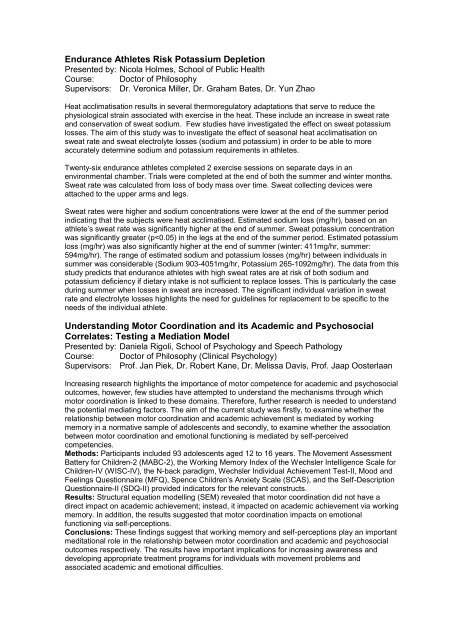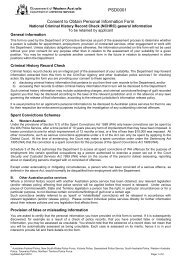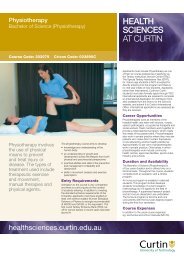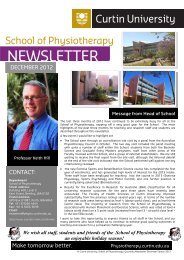Faculty Of Health Science The Mark Liveris Health Science
Faculty Of Health Science The Mark Liveris Health Science
Faculty Of Health Science The Mark Liveris Health Science
You also want an ePaper? Increase the reach of your titles
YUMPU automatically turns print PDFs into web optimized ePapers that Google loves.
Endurance Athletes Risk Potassium DepletionPresented by: Nicola Holmes, School of Public <strong>Health</strong>Course: Doctor of PhilosophySupervisors: Dr. Veronica Miller, Dr. Graham Bates, Dr. Yun ZhaoHeat acclimatisation results in several thermoregulatory adaptations that serve to reduce thephysiological strain associated with exercise in the heat. <strong>The</strong>se include an increase in sweat rateand conservation of sweat sodium. Few studies have investigated the effect on sweat potassiumlosses. <strong>The</strong> aim of this study was to investigate the effect of seasonal heat acclimatisation onsweat rate and sweat electrolyte losses (sodium and potassium) in order to be able to moreaccurately determine sodium and potassium requirements in athletes.Twenty-six endurance athletes completed 2 exercise sessions on separate days in anenvironmental chamber. Trials were completed at the end of both the summer and winter months.Sweat rate was calculated from loss of body mass over time. Sweat collecting devices wereattached to the upper arms and legs.Sweat rates were higher and sodium concentrations were lower at the end of the summer periodindicating that the subjects were heat acclimatised. Estimated sodium loss (mg/hr), based on anathlete’s sweat rate was significantly higher at the end of summer. Sweat potassium concentrationwas significantly greater (p





![Mental health commission report July 2010 - June 2011 [.pdf]](https://img.yumpu.com/50755705/1/184x260/mental-health-commission-report-july-2010-june-2011-pdf.jpg?quality=85)











![2007 Annual Report [.pdf] - Health Sciences - Curtin University](https://img.yumpu.com/44476724/1/184x260/2007-annual-report-pdf-health-sciences-curtin-university.jpg?quality=85)